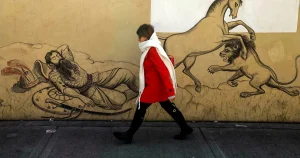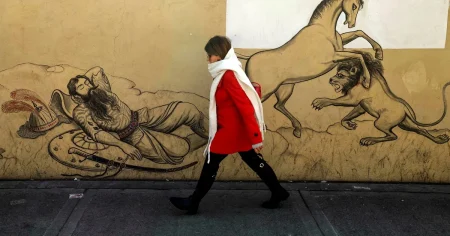Marjane Satrapi, the acclaimed graphic novelist and filmmaker renowned for her autobiographical work ”Persepolis,” has publicly declined France’s highest order of merit, the Legion of Honour. In an open letter addressed to French Culture Minister Rachida Dati and disseminated via social media, Satrapi articulated her reasons for refusing the prestigious award, citing what she perceives as France’s hypocritical stance towards Iran as the primary driver of her decision. This refusal underscores a deep conflict between Satrapi’s personal principles and the symbolic weight of the award, forcing her to choose between honoring her adopted country and holding it accountable for what she sees as inconsistencies in its policies concerning Iran.
Satrapi’s contention revolves around the stark contrast between France’s professed support for the Iranian people, particularly the women-led revolution ignited by the death of Mahsa Amini, and its actions regarding Iranian immigrants and visitors. She highlights the plight of young Iranian dissidents and artists seeking refuge in France who are frequently denied visas, while simultaneously observing the unhindered movement and lavish lifestyles of children belonging to the Iranian oligarchy within French borders. This perceived double standard forms the crux of Satrapi’s argument, exposing what she believes to be a fundamental disconnect between France’s rhetoric and its actual policies. Her refusal of the Legion of Honour becomes a powerful act of protest, amplifying the voices of those denied entry and challenging the French government to reconcile its words with concrete action.
The significance of Satrapi’s decision is amplified by the context of the ongoing revolution in Iran, sparked by the tragic death of Mahsa Amini in September 2022 while in the custody of the morality police. Amini’s death galvanized widespread protests across Iran and the diaspora, becoming a symbol of resistance against the oppressive regime and its systematic violation of women’s rights. Satrapi’s refusal to accept the Legion of Honour directly links her personal act of defiance to the larger movement, aligning herself with the Iranian people and their struggle for freedom. By declining the award, she transforms a personal decision into a political statement, lending her considerable platform and influence to the cause.
Satrapi emphasizes that her refusal of the Legion of Honour should not be interpreted as a rejection of France or its people. She reiterates her deep affection for both her native Iran and her adopted home, France, underscoring the complex emotional landscape underlying her decision. This clarification is crucial in understanding her motivations, demonstrating that her protest is not borne out of animosity towards France, but rather out of a deep-seated desire to hold it accountable for its policies. It reveals the internal struggle of someone torn between loyalty to two countries, ultimately choosing to prioritize her principles and the plight of the Iranian people.
The open letter, published on Satrapi’s social media platforms, serves as a direct appeal to the French government and the public at large. By choosing this medium, Satrapi bypasses traditional channels of communication, ensuring her message reaches a wider audience and fostering public discourse on the issues she raises. This act of public dissent further amplifies the impact of her refusal, transforming a private decision into a public conversation about France’s relationship with Iran and its responsibility to support those fighting for human rights. The letter becomes a catalyst for debate, challenging the status quo and prompting critical reflection on the complexities of international relations and the ethical implications of political decisions.
In conclusion, Marjane Satrapi’s decision to decline the Legion of Honour is a multifaceted act of protest. Driven by her belief in the hypocrisy of French policy regarding Iran, it is a powerful statement of solidarity with the ongoing revolution and a poignant reflection on the complexities of dual national identity. By leveraging her platform and refusing this prestigious award, Satrapi transforms a personal decision into a political act, amplifying the voices of Iranian dissidents and challenging France to align its actions with its professed values. Her open letter serves as a call to action, urging for concrete support for the Iranian people and a re-evaluation of France’s relationship with a regime she believes complicit in ongoing human rights abuses. The act of refusal becomes a symbol of resistance, a testament to the power of individual action and a poignant reminder of the ongoing struggle for freedom and human rights in Iran.














